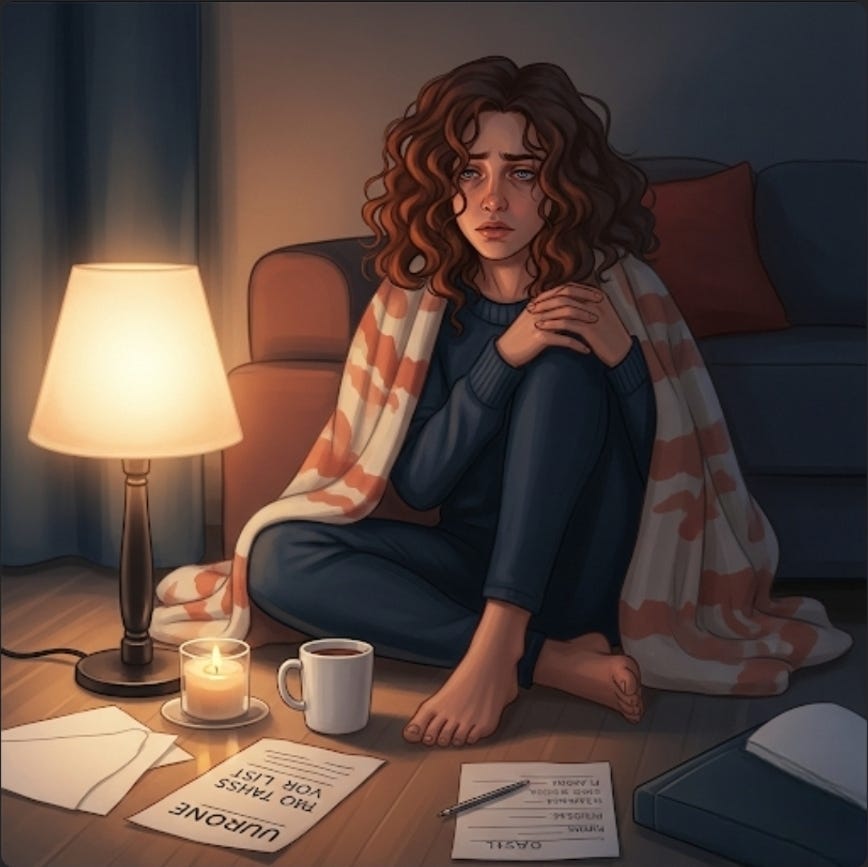Thanks to modern society, we can feel like failures if we become burnt out. So let’s get one thing straight: You are not broken, you’re not lazy you’re not failing. You’re burned out. And burnout is not a flaw in who you are. It’s a red flag rom your nervous system that is screaming: something is not sustainable here.
What Is Burnout?
Burnout isn’t just being “tired.” It’s a state of emotional, physical, and mental exhaustion caused by prolonged stress, pressure, or overwhelm — especially when it feels like there's no end in sight. And let’s face it, our crazy hectic modern lives are one never-ending source of stress from overwhelming well…*waves hands in the air* everything.
Burnout often appears as:
- A deep fatigue, even after sleeping
- Cynicism, irritability, or numbness
- A sense of detachment or meaninglessness
- A drop in productivity, creativity, or care
Been there, done that, got the t-shirt.
Burnout isn’t always caused by work. It can come from caregiving, perfectionism, trauma, hustle culture, survival mode, chronic grief, or simply trying to keep too many plates spinning for too long.
It’s not a weakness. It’s the cost of carrying too much, too quietly, for too long.
What the Psychology Says
Psychologist Christina Maslach, one of the leading researchers on burnout, identifies three core dimensions:
1. Exhaustion – feeling drained with nothing left to give
2. Depersonalization – becoming distant, cynical, or emotionally numb
3. Reduced efficacy – feeling ineffective, like you’re failing even when you’re trying
And here’s the kicker: burnout thrives in environments where we feel undervalued, unsupported, or constantly under pressure — but it gets mislabeled as a personal problem, rather than a systemic one.
In other words: we pathologize the person instead of questioning the system.
Burnout Isn’t Just Mental — It’s Biological
When you’re burned out, your body is stuck in a chronic stress response – your sympathetic nervous system (fight or flight) is constantly switched on, dysregulated. Cortisol is high. Your executive functioning takes a hit. Your memory gets patchy. Emotions feel big and unmanageable — or totally flattened. This isn’t “in your head.” It’s in your body and has physical consequences that a bubble bath won’t fix. Burnout is a protective mechanism.
Why Burnout Feels So Shameful
It feels like it’s your fault, right? Like you’ve done something wrong, somehow. One of the cruelest things about burnout is that it makes the things you love feel heavy like slogging through mud. They’ve lost their enjoyment. You can’t write like you used to, or be a good friend, or get excited about things you once loved. And because we’re taught to tie our worth to our productivity, we start to believe that burnout means we’ve failed.
But burnout is not a personal failing. It’s a natural response to unnatural conditions.
Healing From Burnout Isn’t About “Doing More”
You need to have rest that isn’t just physical but also emotional and sensory. Also validation that what you’re feeling is real. And you need to erect those boundaries that’ll help protect your energy. Also connection with others who let you show up how you are – real, and messy and human. And titrate enchantment – give yourself small doses of wonder and beauty to remind yourself that life isn’t just about surviving it but thriving.
Recovery from burnout isn’t just another to-do checklist. It’s a relearning of what just enough feels like, unlearning that everything is urgent and letting your nervous system recalibrate and balance itself again.
So here’s a gentle reminder: If you feel like you can’t keep up anymore, maybe this is your body’s way of saying you’re not supposed to. Maybe the pace was always impossible to keep up with. Maybe the over-functioning version of yourself is ready to press on the brake pedal. And maybe rest isn’t something that comes ‘after’, but something you do for yourself along the way.
So I’ll leave you with a short practice you can do on those days when you’re starting to feel rundown and overwhelmed.
Write a list called “Things That Still Feel Like Me.” Even if it’s short and the things on it are tiny. Let this be your anchor when you feel like you’re drifting away, and choose one.
Not to solve anything but to bring yourself back to you.
References:
Maslach Burnout Theory: A Comprehensive Guide to Workplace Stress and Exhaustion, neurolaunch.com/maslach-burout-theory/
If this letter found you at the right time, feel free to share it with someone else who might need a little wonder today.
✨ Love this reflection?
You can download a beautifully simple 8-point infographic of the key ideas over in my Ko-fi shop. It’s pay-what-you-want — perfect as a gentle reminder, a journal page, or a quiet moment to come back to.
Dose of Wonder is a free publication.
If something here stirred your heart or made you pause — and you’d like to support my work — you can do so for less than the price of a fancy coffee (just $3).
Click the image below or the ‘Support Me’ link at the top of my page (doseofwonder.ca).
Every small contribution helps keep the wonder flowing.
With heartfelt thanks, always.
— Caitlin
P.S. Want to write for Dose of Wonder?
If you're curious about sharing your voice and ideas here as a guest writer, I’d love to hear from you. Your piece will be sent to all my subscribers—and you can cross-post it to your own audience too.
More eyes. More wonder. More connection.
Curious? Read this article for all the details →
Your Words Matter Here: Contribute to Dose of Wonder
Have you been writing—or wanting to write—about mental health, mindfulness, or personal growth? I'd love to feature your work in Dose of Wonder.









